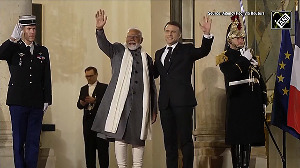Prime Minister Manmohan Singh and Pakistan President Pervez Musharraf are set to give depth and substance to the ongoing composite dialogue between two countries.
Musharraf arrived in India on Saturday on a three-day visit that will mix diplomacy with some cricket.
According to signals available in New Delhi, after the talks between the two leaders, the neighbours will come out with a joint statement that will show the commitment to peace and "forward movement" on various unresolved issues, including Kashmir.
The Failed Agra Summit | Musharraf's visit 2005
India has proposed seven confidence-building measures on Kashmir and also military and trade-related CBM to soften the border between two countries.
Both sides will take up these issues at the delegation-level meeting.
During his stay in New Delhi, Musharraf will meet a political leadership and senior bureaucracy that are better prepared to tackle various issues than the ones he met in 2001.
He will meet a leadership that has drawn the right lessons from the Agra fiasco.
Read about: The Road to Peace
The current set-up in South Block is more open and communicates better with the news-hungry media, which normally plays an important role during such diplomatic events.
Dr Singh and his team are determined not to let themselves be rattled or thrown off balance by any spin Mushrraf might do on the Kashmir issue as he did at Agra.
Dr Singh's team has worked out a road-map for a soft border not only between Jammu and Kashmir and Pakistan-Occupied Kashmir, including what Pakistan calls as Azad Kashmir, and the Northern Areas, but also between Rajasthan and Sindh.
Islamabad's attempts to keep the people-to-people contacts confined to Punjabi-to-Punjabi and Kashmiri-to-Kashmiri will be countered with ideas to expand these to other segments of the Pakistani population, including Sindhis and the Mohajirs.
Pakistan's insistence on a change in the status quo in Kashmir will be met with ideas for a 'status quo plus' -- a value addition in the form of a softer border.
Foreign Secretary Shyam Saran said on Saturday, "Kashmir is an old issue and complex one. India is not putting aside issue of J&K. To address this issue we need to build trust. We have to take people along with us and create a peace constituency."
On the eve of the India-Pakistan peace talks, Dr Singh has displayed his personal commitment to the peace process and would like to ensure peace in South Asia.
His vision is to take as many steps possible to build confidence between two countries. At the same time, his team in South Block is conveying the message that the final solution of Kashmir will not materialise overnight.
The Singh government has already said that "artificial deadlines cannot be imposed. The peace process is like a marathon race."
Dr Singh's vision of Kashmir solution is not close-ended but an "all embracing one."
Sunday's meeting between two leaders will decide how much both sides are willing to run in the marathon race and at what pace.
Dr Singh's efforts are evident at the ground level in J&K too. The state will soon introduce 33 percent reservation for women. More and more regional autonomy is under discussion, decentralisation of power is on the cards.
Dr Singh's idea of converting LoC as a soft border is now being responded to positively by Mushrraf in his last three interviews to the press.
However, the more important question is whether Musharraf will accept India's ideas or he will keep insisting on a change in the status quo relating to sovereignty over territory.
There is a feeling that Musharraf too does not want the Agra 2001 failure to be repeated. The sudden initiative of the Vajpayee government in 2001 to invite him created a wrong impression in his mind that there was battle fatigue in New Delhi and he, therefore, tried to take a hard line.
This time, the initiative for the visit has not come from New Delhi. He wangled for an invitation using the pretext of cricket. It is he who sought this visit and talks and if he tries a repeat of his strategy in 2001 it could prove counter-productive to Pakistan.
Indian leaders and officials, who do not have any illusions about Musharraf's intentions, are keeping their fingers crossed.
This time, it is expected that Mushrraf's actions or utterances will have less drama.
Whatever the ultimate outcome of the visit, there is a quiet confidence that New Delhi 2005 will not be a repeat of Agra 2001.






 © 2025
© 2025